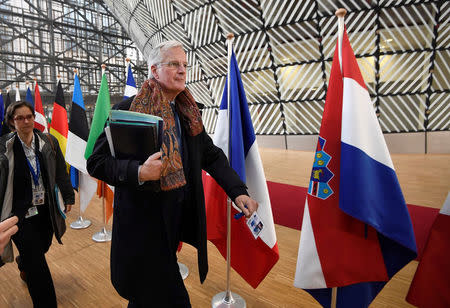London fog over Rome as EU gropes for Brexit unity
By Alastair Macdonald ROME (Reuters) - European leaders hope to paper over simmering disputes when they meet in Rome on Saturday to celebrate 60 years of union, but with Britain filing for divorce next week, the mood will be sombre and unity under strain. Theresa May, who next Wednesday will launch a two-year countdown to Brexit, will be conspicuous by her absence in Rome, as the other 27 EU leaders try to put aside differences for fear the British prime minister could exploit their disunity to cut a sweet deal they fear would encourage others to quit. At the very moment the Islamic State attack on cosmopolitan London was again highlighting risks Europeans face in common, EU Brexit negotiator Michel Barnier was warning Britain not to try to barter security cooperation for better trade terms nor divide the 27, whose joint approval it will need to forge a new treaty. "Unity is the first condition for reaching an agreement in the negotiations," the former French foreign minister said in a speech in Brussels on Wednesday after Monday's confirmation that negotiations will finally begin following June's Brexit vote. "It is of course in our interest," Barnier added. "But it is also -- and I want to say this to our British partners -- in the UK's interest. Because, at the end of the day, we will both need -- you and us -- a united Europe to reach a deal." That was a clear shot across the bows to British officials, who make no secret that they could seek advantage by playing on divisions among EU states, notably between rich trading partners like Germany and poorer eastern countries like Poland, which have many citizens working in Britain and whose EU subsidies are set to take a hit when wealthy Britons leave. Frictions among those remaining have been on show this week as Italians, stepping up security in the wake of the Westminster attack, prepare a largely ceremonial summit on Saturday in the Campidoglio palace, where France, West Germany, Italy and the three Benelux countries signed the founding Treaty of Rome on March 25, 1957. POLISH, GREEK DEMANDS The text of a 60th anniversary Rome Declaration was agreed on Monday by the 27 leaders' aides. It reads: "Europe is our common future." Yet Polish Prime Minister Beata Szydlo said on Thursday she might raise objections and Greece was holding up formal agreement on the brief text while it wrangles with euro zone creditors over its bailout terms. Diplomats dismissed any threat to Saturday's agreement and insisted the text was already approved by all. But the wrangling drew attention again to long-running divisions, notably between east and west and, in the euro zone, between north and south. Poland is determined to block what it fears may be plans to relegate the ex-communist east to second-class membership by the western powers. They are pushing for a more "multispeed Europe", wanting to integrate policy more deeply than some countries want in the hope that may provide jobs and security to thwart rising, Brexit-inspired nationalist opposition to the Union project. References to that in the Rome text were watered down during negotiations to meet Polish demands that such integration projects be open to all states, in line with current treaties. Szydlo also touched the raw nerve of Muslim immigration to Europe by linking it to Wednesday's London attack. Eastern reluctance to take in Syrian refugees, partly on religious grounds, has fuelled talk in the west of subsidy cuts. Within the euro zone, a rift between austerity-hit southern states on the one hand and Germany and its rich northern allies blew up this week when the Dutch chair of the zone's finance ministers appeared to liken the debtors to a spendthrift who blew his cash on "booze and women". BALANCING ACT Saturday's attempt to celebrate 60 years of unity should pass off with smiles, albeit through gritted teeth. But with Brexit under way, the EU may struggle to hold together. A first test will be on April 29, when the 27 meet to agree Barnier's negotiating mandate. That will be two days after the first round of a French presidential election that polls show will put anti-EU nationalist Marine Le Pen into a May 7 runoff. It is against that background -- and a still improbable Le Pen presidency would make Brexit look like the least of the EU's woes -- that the 27 leaders face a tricky balancing act between pursuing national interests, including appeasing eurosceptics at home, and preserving a union they all believe benefits them in a world potentially dominated by Chinese, Americans and Russians. Amid all this wrangling, Germans who will decide on giving a fourth term in September to the Union's dominant leader, Angela Merkel, offered a message of hope for the bloc: echoing surveys in other countries since Britain voted to quit, German support for the EU rose sharply, hitting a 25-year high. They may also get some encouragement from a higher power when they meet Pope Francis at the Vatican on Friday evening -- though the first non-European pontiff in over a millennium has in the past also chided the EU for rebuffing refugees and losing sight of its values, becoming old, "fearful and self-absorbed". (Editing by Gareth Jones, Larry King)

 Yahoo News
Yahoo News 

